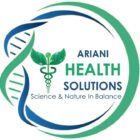Gut Health
Written by: Dr Arien van der Merwe MBChB FRSPH MISMA NHA
Introduction
Billions of microorganisms live on  and inside us. Most are beneficial, some are potential pathogens. The beneficial ones are called probiotic microorganisms. Lactobacillus (e.g. L acidophilus and L plantarum) bacteria reside mostly in the small intestine, and Bifidobacterium bifidum are found in the large intestine (colon).
and inside us. Most are beneficial, some are potential pathogens. The beneficial ones are called probiotic microorganisms. Lactobacillus (e.g. L acidophilus and L plantarum) bacteria reside mostly in the small intestine, and Bifidobacterium bifidum are found in the large intestine (colon).
Probiotics improve the environment of the intestinal tract. The regular use of probiotics is important in healing many chronic gastrointestinal problems and allergies. Some experts feel that children with allergic tendencies, need several times the amount of probiotics than those without GI (gastrointestinal) problems, due to the frequency of dysbiosis (overgrowth of yeast, bacteria, etc.) and ‘leaky gut syndrome’ (increased intestinal permeability).
Examples of wellknown probiotics include Saccharomyces boulardii, Lactobacillus acidodiphilus and plantarum and Bifidobacterium bifidus, to restore normal gut flora, improve immune system function and assist in digestion and absorption of food. Also helpful are the pre-biotics, inulin and fructooligosaccharides (FOS). FOS and inulin are non-digestible oligosaccharides that help promote the growth and activity of friendly bacteria in the intestinal tract. These are called \’pre-biotics\’ because they are thought to help promote probiotic colonisation and growth. These are oligosaccharides which are non-caloric compounds that can not be broken down by our digestive enzymes and therefore do not adversely affect blood sugar levels. Research has shown that both FOS and inulin enhance the growth of lactic bacteria, especially Bifidobacteria, and inhibit the growth of a variety of undesirable organisms.
Scientific studies over the last 50 years show that probiotic organisms can improve the nutritional quality of foods, produce antibiotics, anti-carcinogens, and substances that break down and assist in secretion of toxins inside their human host.
The major benefits of adding probiotic organisms to the diet:
- Support of the immune system
- Improved resistance to allergies
- Reduction in yeast and other infections
- Inhibition of disease causing organisms
- Improved digestion, increased nutrient absorption and vitamin synthesis
- Detoxification and protection from toxins
- Prevention of diarrhea from various causes
- Reduction in the risk of irritable bowel syndromes
- Cancer-protective effects
It is essential to choose a probiotic that has been extensively researched with a great deal of scientific support behind it. Capsules are the preferred way to take probiotics because there is more protection from contamination, oxygen and moisture, while capsules maintain organism integrity. Some capsules are specially coated to ensure that the microorganisms will safely reach their destination. Probiotics are not adversely affected by the use of digestive enzymes. Both can be taken at mealtimes.
Probiotics act in various ways to restore and maintain gut health. The exact mechanism by which most probiotics exert their action is still unclear. Possible mechanisms, which have been demonstrated, include the production of a protease that inactivates the toxin A receptor, the production of increased levels of secretory IgA and IgA antitoxin A and competition for attachment sites. Research results suggest that probiotics effectively prevent diarrhoea caused by amoxicillin in combination with clavulanate as well as intravenously administered cefuroxime.
The mode of action of probiotics in summary:
- Microbial antagonism
- Anti-toxigenic effect
- Increase in the activity of the intestinal disaccharidases
- Support of the immune system
- Restoring balance of normal intestinal flora
Digestive enzymes are also very helpful in restoring balance to the intestinal flora population. These can be found in supplement combinations containing pancreatic enzymes (amylase, protease, sucrase, malt diastase, lipase, cellulose, lactase), papain form paw-paw, bromelain from pineapple stem and cultured moulds from Aspergillus species.
Bio summary:
Dr Arien van der Merwe MBChB (Pretoria) FRSPH (London) MISMA (UK) NHA (SA) is a medical doctor with extensive experience in natural and complementary medicine, stress management, workplace wellness and health promotion. She has been elected Fellow of the Royal Society of Public Health (FRSPH) in the UK for the work she does in South Africa to promote public health and wellness through education, training and communication. As director of Health Stress Management Gauteng (Pty) Ltd, Dr Arien acts as wellness advisor and consultant, stress expert and program developer to the health care industry, health care funders (medical aids), companies, interest groups, websites and the media. Arien is an accomplished author of 19 books and a CD-rom on health, wellness and natural remedies, the latest being ‘Health & Happiness’, ‘Herbal Remedies’ and ‘Stress Solutions’. She presents regular stress management and natural wellness workshops in South Africa and abroad.

Good day
I am an occupational health nurse at a International company in Alrode. I notice high stress levels for the last 3 years in the company due to personal, work related issues.
What will the cost be for stress management workshops for the employees?
Thank you